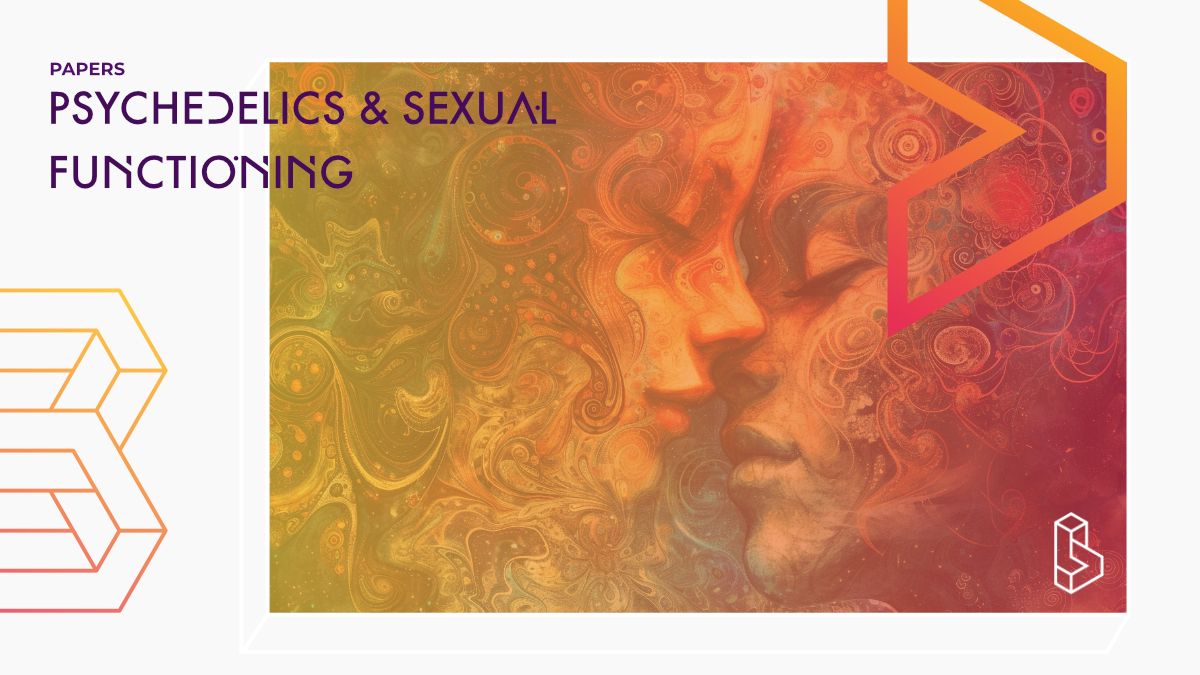This mixed-methods study combines data from two studies, one large naturalistic study (n=261) and one smaller controlled clinical trial (n=59), to investigate the post-acute effects of psychedelics on self-reported sexual functioning. It finds that naturalistic use of psychedelics is associated with improvements in sexual pleasure, communication, satisfaction with one’s partner, and physical appearance. Similarly, a controlled trial comparing psilocybin therapy with the SSRI escitalopram for depression shows that patients treated with psilocybin report positive changes in sexual functioning, unlike those treated with escitalopram.
Abstract of Psychedelics and sexual functioning
“Do psychedelics affect sexual functioning postacutely? Anecdotal and qualitative evidence suggests they do, but this has never been formally tested. While sexual functioning and satisfaction are generally regarded as an important aspect of human wellbeing, sexual dysfunction is a common symptom of mental health disorders. It is also a common side effect of selective serotonin reuptake inhibitors (SSRIs), a first line treatment for depression. The aim of the present paper was to investigate the post-acute effects of psychedelics on self-reported sexual functioning, combining data from two independent studies, one large and naturalistic and the other a smaller but controlled clinical trial. Naturalistic use of psychedelics was associated with improvements in several facets of sexual functioning and satisfaction, including improved pleasure and communication during sex, satisfaction with one’s partner and physical appearance. Convergent results were found in a controlled trial of psilocybin therapy versus an SSRI, escitalopram, for depression. In this trial, patients treated with psilocybin reported positive changes in sexual functioning after treatment, while patients treated with escitalopram did not. Despite focusing on different populations and settings, this is the first research study to quantitively investigate the effects of psychedelics on sexual functioning. Results imply a potential positive effect on post-acute sexual functioning and highlight the need for more research on this.”
Authors: Tommaso Barba, Hannes Kettner, Caterina Radu, Joseph M. Peill, Leor Roseman, David J. Nutt, David Erritzoe, Robin Carhart-Harris & Bruna Giribaldi
Summary of Psychedelics and sexual functioning
Psychedelic substances were studied in clinical settings for the treatment of mood disorders and alcohol dependence in particular. Psilocybin-therapy was found to be as effective as a 6-week course of the selective serotonin reuptake inhibitor (SSRI), escitalopram, at reducing depressive symptoms in major depressive disorder.
Major depressive disorder (MDD) is characterised by episodes of extreme low mood, motivation, ability to feel pleasure (anhedonia), and cognitive ability. Sexual dysfunction (SD) is a common side effect of SSRIs, and is therefore a risk factor for treatment adherence and relapse.
Sexual dysfunction has been found to be associated with lower well-being in healthy populations. Sexual satisfaction is also important for a satisfying and meaningful life, both in healthy subjects and individuals with depression.
Find this paper
Psychedelics and sexual functioning: a mixed-methods study
https://doi.org/10.1038/s41598-023-49817-4
Open Access | Google Scholar | Backup | 🕊
Cite this paper (APA)
Barba, T., Kettner, H., Radu, C., et al. (2024). Psychedelics and sexual functioning: A mixed-methods study. Scientific Reports, 14(1), Article 2181. https://doi.org/10.1038/s41598-023-49817-4
Study details
Participants
320
Humans
Linked Research Papers
Notable research papers that build on or are influenced by this paper
Trial of Psilocybin versus Escitalopram for DepressionThis double-blind placebo-controlled study (n=59) compared psilocybin (2x25mg; 3 weeks apart) to escitalopram (SSRI) over a six-week period and found large improvements in depression scores for those suffering from depression (MDD) in both groups. On the main measure of depression, the QIDS-SR-16, there was no significant difference between both groups. The study did find significant differences, favoring psilocybin, on the HAM-D-17, MADRS, avoidance, flourishing, wellbeing, and suicidality.
Linked Clinical Trial
Psilocybin vs Escitalopram for Major Depressive Disorder: Comparative MechanismsThis is a randomised double-blind clinical trial. The aim is to compare the efficacy and mechanisms of action of psilocybin, the primary psychoactive substance in 'magic mushrooms', with the SSRI (selective serotonin reuptake inhibitor) escitalopram for major depressive disorder (MDD).

